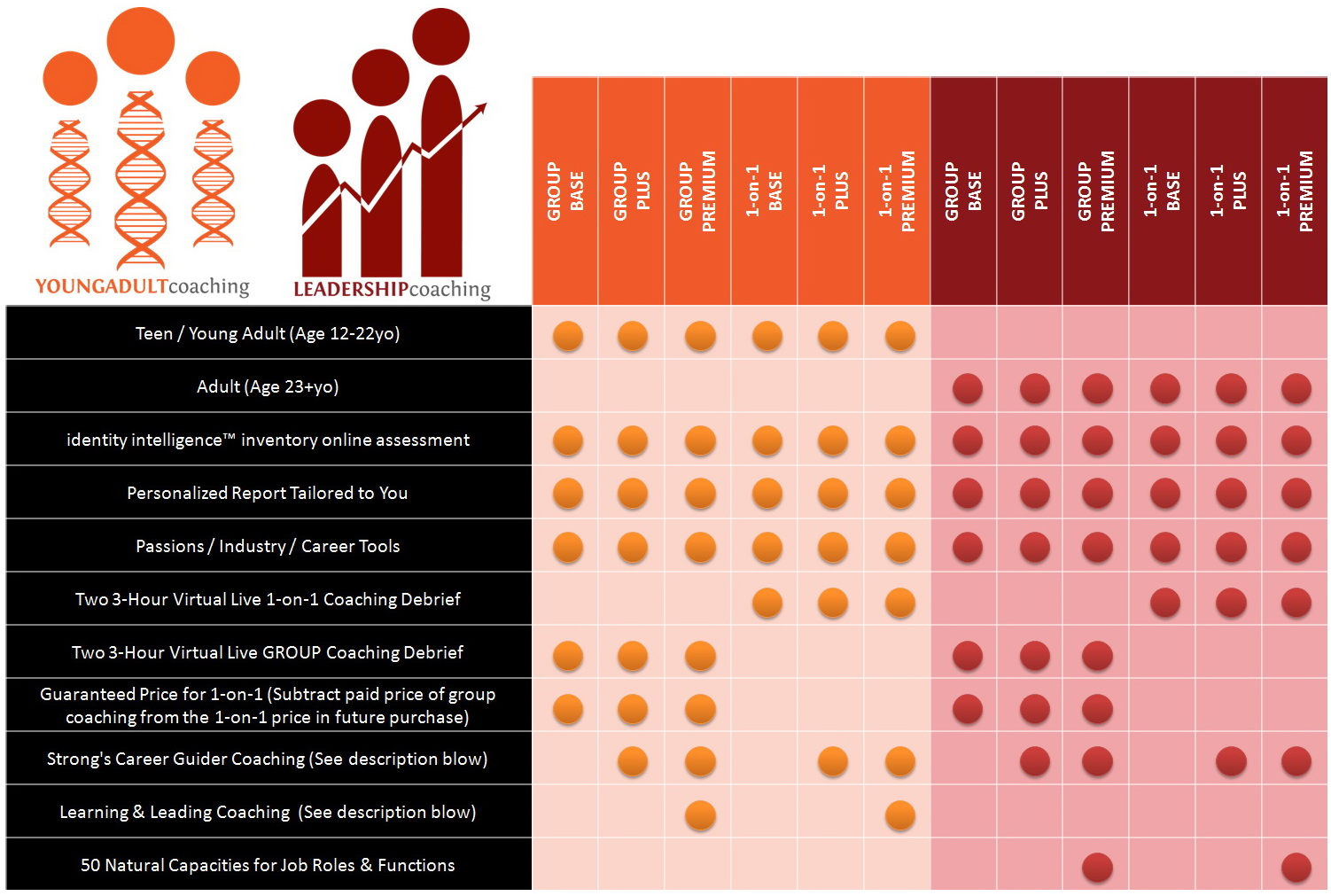
IDENTITY INTELLIGENCE™ PLUS PACKAGE (STRONG'S CAREER)
Entire Base Package Plus: Strong's Career Guider which focuses on many specific careers that would fit you. The results link to the Department of Labor's website to help you research careers which fit you.
These are some of the insights you can expect:
The plus package helps you explore the path that is right for you by identifying specific college courses, jobs or internships, and extracurricular activities that will allow you to express your unique interests and personal style. You will receive step-by-step advice on how to evaluate academic majors that fit your interests and preferences and provides extra help for college students beginning to prepare themselves for success in the world of work.
- 6 General Occupational Themes map out broad interest patterns to describe personalities and preferred work environments
- 30 Basic Interest Scales provide more specific information about your areas of interest
- 5 Personal Style Scales describe your preferred style of working, learning, leading, risk taking, and team participation
- 260 Occupational Scales relate your interest patterns to those of satisfied workers
- Plus four pages of highly personalized information to help you student identify college courses, jobs or internships, and extracurricular activities.
IDENTITY INTELLIGENCE™ PREMIUM PACKAGE (Leading & Learning)
Entire Base Package & Plus Package but combined with a leadership report and a learning report.
These are some of the insights you can expect from the Learning Report:
How can you learn most effectively? What activities are more natural and effective for you based on your personality traits? What is your learning style and how can you set yourself up for academic success?
Academic Performance Goals: How much energy should you put into relationships and special interests? Should you be a well-rounded student; or should you focus on becoming a subject specialist?
Social Learning Styles: Would you thrive in traditional classroom instruction; or would you learn best with an advisor-mentor? Would you be good with independent study? Are you highly adaptable and able to combine multiple learning styles?
Distractions: How can you cope with inevitable stressors that come between your college goals? How much noise and activity do you need? Do you need to isolate yourself during certain times of study, reading, and writing – or will off-task distractions help you?
Errors: Each of us is prone to error. Giving the professor what (s)he wants is the route to success whether studying, writing a paper, or giving a speech. Understanding your tendencies toward errors can help you ‘make the grade’.
Cooperative Learning: Teamwork is more important than ever to both professors and employers. The Learner Report presents roles required for overall successful team learning, and how naturally your traits support each of the roles.
These are some of the insights you can expect from the Leading Report:
The Leader Report is not an assessment of your actual performance in a given leadership model, but rather the degree to which your personality traits would tend to provide natural energy for standard leadership models.
Delegation: What are the four primary phases of the delegation process, and what is your natural energy to actualize each phase?
Escalation Of Commitment: Where might you be prone to NOT abandon a decision that proved to be wrong?
Sound Versus Speedy Decision Making: How does your organizational skills, discipline, and methodicalness affect good decision making?
Furnham Management Study: Discover your natural energy in ten key indicators of management effectiveness: Drive to Achieve, Drive to Lead, Conceptual Ability, Intuition, Interpersonal Sensitivity, Social Adaptability, Optimism, Resilience, Interest in Business, & Internal Locus of Control
Sea Leadership Model: Leadership occurs when someone takes responsibility for effecting a necessary change. Discover which areas you have natural energy to affect change.
Situational Leadership: The proper leadership style depends on the situation -- with an emphasis on either the relationship or the technical nature of the task. In which leadership contexts will you tend to shine?
